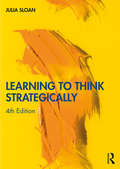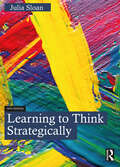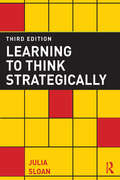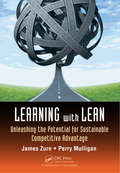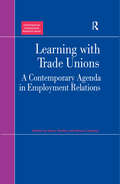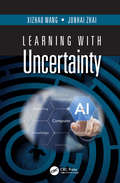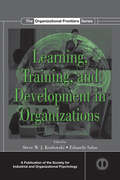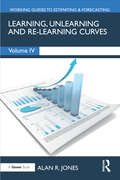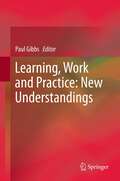- Table View
- List View
Learning to Think Strategically
by Julia SloanStrategic thinking has become a core competency for business leaders globally. Overused and under-defined, the term is often used interchangeably with other strategic management terms. This textbook delineates and defines strategic thinking as an advanced, conceptual cognitive capability, focusing on the nonlinear, divergent, a-rational and informal nature of strategic thinking. This unique and practical text is an original primer of how successful strategists learn to think strategically. In this fourth edition, the author offers an expanded definition of strategic thinking based on critical theory. This book highlights the role of informal learning, underscores the relevance of engaging in the arts, and has global application for those tasked with making strategy in this rapidly changing world. Sloan presents a previously unexamined account of the relationship between strategic thinking and the learning process involved — taking learning from the academic to the everyday. New features include an expanded list of learning methods to develop strategic thinking, a more extensive look at global cultural perspectives of strategic thinking, additional scenarios and case vignettes, and online resources comprising test bank questions and lecture slides. This book is vital reading for MBA, Strategy, Leadership Development, and Executive Education students. The practical nature of this book also makes it valuable for business and policy executives, as well as managers and emerging leaders looking to develop their strategic thinking skills.
Learning to Think Strategically
by Julia SloanStrategic thinking has become a core capability for business leaders globally. Now in its fifth edition, this comprehensive text is an original primer for how successful strategists learn to think strategically. It delineates and defines strategic thinking as an advanced, conceptual cognitive capability, focusing on the nonlinear and informal nature of strategic thinking. The book highlights the role of informal learning, underscores the relevance of engaging in the arts, and has global application for those tasked with making strategy in this rapidly changing world.This edition has been fully updated to include a new chapter on AI and strategic thinking, as well as expanded coverage of the critical reflective process and the challenges of introducing strategic thinking across cultures. Additional pedagogical features have been incorporated, including more discussion questions and exercises to engage debate and reflection, additional scenarios, and case vignettes.Learning to Think Strategically is vital reading for MBA, strategy, leadership development, and executive education students. Its practical nature also makes it valuable for business and policy executives, as well as for managers and emerging leaders looking to develop their strategic thinking skills. Online resources include PowerPoint slides, a test bank, and video clips.
Learning to Think Strategically (New Frontiers In Learning Ser.)
by Julia SloanStrategic thinking has become a core competency for business leaders globally. Overused and under-defined, the term is often used interchangeably with other strategic management terms. This textbook delineates and defines strategic thinking as a conceptual cognitive capability, focusing on the nonlinear, divergent, and informal nature of strategic thinking. In this third edition of a popular text, the author provides an unconventional definition and model for strategic thinking based on critical theory. This research-based book introduces the concept as the foundation of business strategy that is distinct from strategic planning and strategic implementation. New features, including executive summaries and key critical reflective questions, along with new and updated figures, make the book vital reading for MBA, leadership development, and executive education students. The practical nature of this book also makes it valuable for business and policy executives, managers, and emerging leaders.
Learning to Win in China's Many Markets
by Jonathan Woetzel Jimmy HexterToday and tomorrow, marketers in China must be able to monitor changes in their product areas and adapt to them more quickly than in most markets around the world, against fierce competition, and in an atmosphere of flux and uncertainty. The best of them will proactively shape emerging markets and customer segments, leveraging marketing capabilities by learning and adapting quickly.
Learning with Big Data
by Viktor Mayer-Schönberger Kenneth CukierHomework assignments that learn from students. Courses tailored to fit individual pupils. Textbooks that talk back. This is tomorrow's education landscape, thanks to the power of big data. These advances go beyond the much-discussed rise of online courses. As the New York Times-bestselling authors of Big Data explain, the truly fascinating changes are actually occurring in how we measure students' progress and how we can use that data to improve education for everyone, in real time, both on- and offline. Learning with Big Data offers an eye-opening, insight-packed tour through these new trends, for educators, administrators, and readers interested in the latest developments in business and technology.
Learning with Cases
by Thomas V. BonomaGives some tips to maximize all learning; offers the pros and cons of experiential learning (cases) as a method; and gives some guidelines for effective case preparation, discussion, and learning.
Learning with Lean: Unleashing the Potential for Sustainable Competitive Advantage
by James Zurn Perry MulliganThe toughest Lean journeys are those taken in organizations that have achieved long-term success. Processes and people become fixed in their ways and exhibit a natural resistance to change. But, regardless of how well your organization is performing, unless you have a sustainable competitive advantage, you are at risk.Examining the performance gap between good organizations and great ones, Learning with Lean: Unleashing the Potential for Sustainable Competitive Advantage explains how to use Lean as a learning vehicle for achieving and sustaining a competitive advantage.Helping you better understand the current state of your organization, the book outlines a series of five simple phases for developing an architecture and implementation plan to transform your organization‘s performance. These five phases fit neatly into a closed-system model that has similarities to the Plan-Do-Check-Act quality model. The model is simple, easy to communicate, and easy to implement Assess, Plan, Prepare, Do, and Learn.Supplies a brief overview of Lean toolsProvides an understanding of the Voice of the Customer as a focusing engineCovers measurement and goal settingIllustrates the dynamics of organizational change Explains how to boost learning through LeanThe authors guide you through the deployment of training and the implementation of new knowledge and skills around Lean. In addition, they also explain how to find and improve on the areas where waste exists so your organization can reinvent the way it learns.Effective management techniques recognize the need for balance, and this book is no different. Helping you pinpoint where those balances and dichotomies exist, it arms you with powerful techniques to manage these challenges and to transform your organization into a change-hungry Lean learni
Learning with Trade Unions: A Contemporary Agenda in Employment Relations (Contemporary Employment Relations)
by Moira CalveleyThis edited collection provides an understanding of the range of learning that is enabled by trade unions, and the agendas around that learning. It comes at an important time as, in the UK, recent years have seen significant new opportunities for unions' involvement in the government's learning and skills policy. At the same time, trade unions have had to cope with declining membership and changing employment patterns, and thus have a keen interest in defining their role in contemporary employment relations and in pursuing strategies for union renewal. Therefore, in order to explore these dynamics, a strong feature of the book is its drawing together of informed, research-based contributions from the fields of training, skills and education, and of industrial relations. International and historical perspectives are included in order to better understand the contemporary issues. There are important conclusions for policy-makers, practitioners and researchers.
Learning with Uncertainty
by Xizhao Wang Junhai ZhaiLearning with uncertainty covers a broad range of scenarios in machine learning, this book mainly focuses on: (1) Decision tree learning with uncertainty, (2) Clustering under uncertainty environment, (3) Active learning based on uncertainty criterion, and (4) Ensemble learning in a framework of uncertainty. The book starts with the introduction to uncertainty including randomness, roughness, fuzziness and non-specificity and then comprehensively discusses a number of key issues in learning with uncertainty, such as uncertainty representation in learning, the influence of uncertainty on the performance of learning system, the heuristic design with uncertainty, etc. <P><P>Most contents of the book are our research results in recent decades. The purpose of this book is to help the readers to understand the impact of uncertainty on learning processes. It comes with many examples to facilitate understanding. The book can be used as reference book or textbook for researcher fellows, senior undergraduates and postgraduates majored in computer science and technology, applied mathematics, automation, electrical engineering, etc.
Learning, Capability Building and Innovation
by Keun Lee Richard Nelson Gabriela Dutr�nit Alexandre O. Vera-Cruz Luc SoeteToday, a large number of scholars studying development understand this process as involving learning and capability building. Capability building is an active, not a passive, process. It requires a purposeful effort from the learner's side, with support and commitment on allocation of time and resources toward learning activities. This process implies the possibility of failure as well as success, as we also learn from failures. A global cast of academics and policy makers examines economic development as a process of learning and technological accumulation, showing how economic development is a process involving creative destruction. While markets and market competition play major roles in structuring the development process, non-market institutions and government policies matter.
Learning, Environment and Sustainable Development: A History of Ideas
by William Scott Paul VareThis book is an introduction to the long history of human learning, the environment and sustainable development – about our struggles with the natural world: first for survival, then for dominance, currently for self-preservation, and in future perhaps, even for long-term, mutually beneficial co-existence. It charts the long arc of human–environment relationships through the specific lens of human learning, putting on record many of the people, ideas and events that have contributed, often unwittingly, to the global movement for sustainable development. Human learning has always had a focus on the environment. It’s something we’ve been engaged in ever since we began interacting with our surroundings and thinking about the impacts, outcomes and consequences of our actions and interactions. This unique story told by the authors is episodic rather than a connected, linear account; it probes, questions and re-examines familiar issues from novel perspectives, and looks ahead. The book is of particular interest to those studying (and teaching) courses with a focus on socio-economic and environmental sustainability, and non-governmental organisations whose work brings them face-to-face with the general public and social enterprises.
Learning, Leading, and the Best-Loved Self in Teaching and Teacher Education (Palgrave Studies on Leadership and Learning in Teacher Education)
by Cheryl J. Craig Gayle A. Curtis Denise M. McDonaldThis book explores the concept of the "best-loved self" in teaching and teacher education, asserting that the best-loved self is foundational to the development of teacher identity, growth in context, and learning in community. Drawing on the work of Joseph Schwab, who was the first to name the "best-loved self," the editors and their contributors extend this knowledge further through the collaboration of their group of teacher educators, known as the Faculty Academy, who have been involved in examining teacher education for over two decades.
Learning, Training, and Development in Organizations (SIOP Organizational Frontiers Series)
by Steve W. J. KozlowskiThis scholarly book in SIOP’s Organizational Frontier series looks at research on enhancing knowledge acquisition and its application in organizations. It concentrates on training, design and delivery given the changing nature of work and organizations. Now that work is increasingly complex, there is greater emphasis on expertise and cognitive skills. Advances in technology such as computer simulations and web-based training are necessitating a more active role for the learner in the training process. In the broad context of the organization systems, this book promotes learning and development as a continuous lifelong endeavor.
Learning, Unlearning and Re-Learning Curves (Working Guides to Estimating & Forecasting #4)
by Alan R. JonesLearning, Unlearning and Re-learning Curves (Volume IV of the Working Guides to Estimating & Forecasting series) focuses in on Learning Curves, and the various tried and tested models of Wright, Crawford, DeJong, Towill-Bevis and others. It explores the differences and similarities between the various models and examines the key properties that Estimators and Forecasters can exploit. A discussion about Learning Curve Cost Drivers leads to the consideration of a little used but very powerful technique of Learning Curve modelling called Segmentation, which looks at an organisation’s complex learning curve as the product of multiple shallower learning curves. Perhaps the biggest benefit is that it simplifies the calculations in Microsoft Excel where there is a change in the rate of learning observed or expected. The same technique can be used to model and calibrate discontinuities in the learning process that result in setbacks and uplifts in time or cost. This technique is compared with other, better known techniques such as Anderlohr’s. Equivalent Unit Learning is another, relative new technique that can be used alongside traditional completed unit learning to give an early warning of changes in the rates of learning. Finally, a Learning Curve can be exploited to estimate the penalty of collaborative working across multiple partners. Supported by a wealth of figures and tables, this is a valuable resource for estimators, engineers, accountants, project risk specialists, as well as students of cost engineering.
Learning, Work and Practice: New Understandings
by Paul GibbsThis book's original contribution to a crowded literature on work and learning will attract strong international interest. Its focus on the philosophy of learning at work brings a fresh perspective on a topic normally viewed through psychological, anthropological and sociological eyes. It assembles a host of internationally recognized scholars who reflect on the various philosophies of work-based learning. Full of distinctive and original contributions that provide perceptive insights into the subject, the work will be a practical support to teachers, trainers and researchers at the same time as it gives readers a clear philosophical grounding in learning at work. It is, however, not simply a book about philosophy, but a gazetteer of approaches to education in work that will sustain and inspire those who provide, engage in, and support the learning of new knowledge and skills in the workplace. With adaptability to new employment opportunities so vital to existing workers, the authors stand behind continued provision of work-based learning in the face of tightening economic constraints.
Lease Accounting and Analysis
by David F. HawkinsDiscusses global accounting for leases by lessees and lessors with emphasis on U.S. lease accounting standards. A rewritten version of an earlier note.
Leases & Rental Agreements
by Janet Portman Marcia StewartEssential rental forms every landlord needs Looking for a quick way to create the key documents necessary for owning or managing rental property, including a legally valid lease or rental agreement? Leases & Rental Agreements provides the practical and legal information necessary you need. With this bestselling guide, you'll learn how to: prepare a rental agreement or lease tailor your documents to meet your needs make required disclosures to tenants comply with your state's laws on security deposits, privacy rules, discrimination, and more check tenant references and credit, and do a final inspection when a tenant moves out. The 12th edition provides updated 50-state information on security deposits, rent rules, access to rental property and more. All forms are downloadable from the Nolo website.
Leases & Rental Agreements
by Marcia StewartRent your property now with this quick and easy handbook. Looking for a quick way to create the key documents necessary for owning or managing rental property, including a legally valid lease or rental agreement? Leases & Rental Agreements provides the practical and legal information necessary to rent out your property in record time -- and without a pricey attorney. With this bestselling guide, you'll learn how to: prepare a rental agreement or lease tailor your documents to meet your needs make required disclosures comply with your state's laws on security deposits, privacy rules, discrimination and more check tenant references and credit do a final inspection when a tenant moves out step-by-step instructions to fill out the forms and more This edition provides updated 50-state legal charts on security deposits, rent rules, access to rental property and more, plus an expanded chart on your state's disclosure laws.
Leases & Rental Agreements (7th edition)
by Ralph Warner Janet Portman Marcia StewartThis excellent book should be required reading for all landlords and tenants. It is easy reading yet filled with important, accurate and profitable information.
Leases & Rental Agreements: Keep Your House or Walk Away With Money in Your Pocket
by Janet Portman Marcia StewartCreate a solid, binding lease that complies with your state laws If you rent out residential real estate, you need to create documents that are legally valid where your rental property is located. Every state’s rules are different when it comes to what landlords must include in their leases, and stationery store forms don’t tell you what you need to know. Not only does this book contain instructions on how to tailor your rental documents to your state’s laws, it also gives you customizable copies of key rental forms you need, including: a fixed-term lease a month-to-month rental agreement a rental application tenant reference and credit check forms move-in and move-out letters, and a property inspection checklist. The 13th edition is completely updated to reflect the latest state landlord-tenant laws—find out what your state requires regarding security deposits, entry to rental property, disclosures, termination notices, and much more. This new edition also covers topics relevant to today’s landlords, such as how to handle online transactions, how to make sure e-signatures are valid, and how to comply with laws protecting your tenants’ private information.
Leases and Rental Agreements (Tenth Edition)
by Ralph Warner Janet Portman Marcia StewartLooking for a quick way to create the key documents necessary for owning or managing rental property, including a legally valid lease or rental agreement? Leases & Rental Agreements provides the practical and legal information necessary you need. With this bestselling guide, you'll learn how to: - prepare a rental agreement or lease - tailor your documents to meet your needs - make required disclosures to tenants - comply with your state's laws on security deposits, privacy rules, discrimination and more - check tenant references and credit - do a final inspection when a tenant moves out This edition provides updated 50-state information on security deposits, rent rules, access to rental property and more, plus an expanded chart on state disclosure laws.
Leases for Lives: Life Contingent Contracts and the Emergence of Actuarial Science in Eighteenth-Century England
by David R. BellhouseMany historians of insurance have commented on the disconnect between the rise of English life insurance companies in the early eighteenth century and the mathematics behind the sound pricing of life insurance products that was developed at about the same time. Insurance and annuity promoters typically ignored this mathematical work. Bellhouse explores this issue, and shows that the early mathematical work was not motivated by insurance but instead by the fair valuation of life contingent contracts related to property. Even the work of the mathematician James Dodson in the creation of the Equitable Life Assurance Society, offering sound actuarially based premiums, did not change the industry in any significant way. The tipping point was a crisis in 1770 in which the philosopher and mathematician Richard Price, as well as other mathematicians, showed that a dozen or more recently formed annuity societies could not meet their financial obligations and were inviable.
Leasing Computers at Persistent Learning
by Devin ShanthikumarNewly public Persistent Learning is acquiring vital computer assets. They need to determine how the lease or purchase decision will impact their financial statements, and how the market will react given previously forecast earnings and competitor's accounting.
Leasing Decision at Magnet Beauty Products, Inc.
by Krishna G. Palepu George SerafeimA fast-growing retailer is facing two different leasing options for its stores. In choosing between the two options, management is considering the potential impact of the two options on the company's financial statements, in light of the proposed new accounting standard for leases.
Least Developed Countries and the WTO
by Helen HawthorneA norm of special treatment for LDCs, created by the UN, has spread to various international organisations including the WTO. Within the WTO evidence of the institutionalization of the norm can be found both in the agreements and legal documents and the way in which the LDCs have been treated by other states. Helen Hawthorne investigates how norms impact on negotiations in international organisations. She shows that few studies of international organisations focus on the role of the weaker states in the organization, the majority focus either on the major states or the emerging economies. By ignoring the role of the poorer, weaker states in the GATT/WTO we are ignoring the history of these states in the organisation and do not get a true picture of the organization, how it operates in relation to them and their impact on the organisation.
